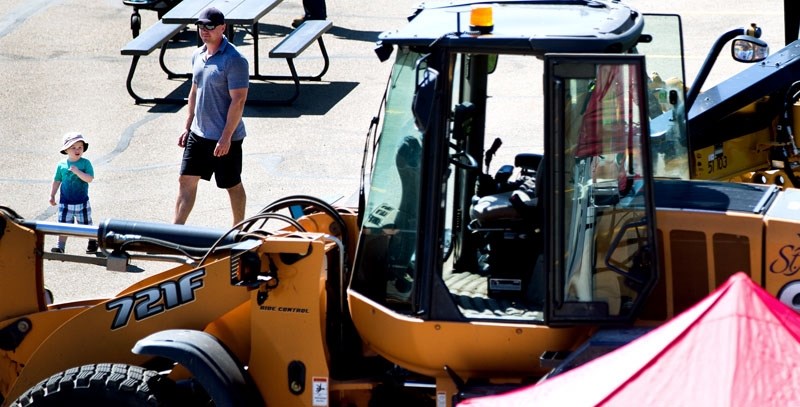The Alberta RCMP Explosive Disposal Unit (EDU) was in St. Albert on Sunday, but it was for a more light-hearted mission than the unit’s usual work.
The EDU was one of the public safety exhibits at the Public Safety Open House at St. Albert Centre this weekend. The robots at the EDU booth caught the eye of many children passing by, giving the unit members manning the station the opportunity to educate the interested youngsters on their jobs. Sgt. Greg Baird was happy to spread the word.
“There’s so much more to the RCMP than just what they may see on the streets or read in the paper. I guess things have to be pretty bad for us to show up, not unlike other specialized units as well. We all have a role.”
In the case of the EDU, that role is very dangerous, but necessary. A typical day on the job for a member of the unit could include responding to calls about suspicious devices in residences and public spaces, and responding to discoveries of explosives in municipal and rural areas. The unit also performs sweeps to ensures the areas around VIPs and dignitaries in the province are clear of explosives. Often, the EDU will join with the dog team to perform sweeps.
Sgt. Baird remembers one incident that happened in Innisfail in 2001. The tragic case involved a young mother who lost her life as a result of a bomb going off. Baird says the week of the incident was tedious, as they had to deal with the scene, piece together what the device might have looked like and prepare for court.
He says his favourite part of the job has been travelling to far-away destinations including Brazil, Colombia and Jordan to assist in training first responders who are not experienced in explosives disposal.
“That’s been a highlight for me to be able to do that and to pass on what our role is within the first responders community to other police forces and other first responders around the world.”
The training never ends for any member of the EDU. The unit uses technology such as robots to assist in many cases for surveillance and safety purposes, forcing members to constantly update their knowledge.
“With the advancement of technology things change,” said Sgt. Baird. “Anything that will promote our safety and other members’ safety, we’re definitely all over that. The advancements have been fantastic. It’s been great, but at the same time it is a lot of work.”
Also a lot of work is wearing the heavy bomb suit that EDU members must don in the case that robots are not a sufficient solution. Sgt. Baird says the suit weighs approximately 80 lbs. On a hot day, it can only be worn for around 20 minutes before the heat becomes too much, but it is a necessary protection that must be endured.
“It’s heavy for a reason. It’s for our protection. It’s pretty much our last line of defence,” said Sgt. Baird about the suit.
Being a member of the EDU is not easy. Members must complete five weeks of training upon entry to the unit, and then commit to constant monthly training to keep their skills up to date.
“If you don’t do it, you’re going to lose your ability to do the job,” said Sgt. Baird. “We can’t afford not to be able to do our job, that’s why when we do our training days it’s critical that the guys are getting the most out of it and staying safe because they need to know what they are doing.”
Sgt. Baird says to call RCMP if you see anything that could be dangerous so they can send members to investigate.




